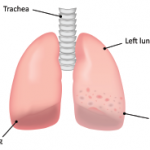QUESTION: The burden from methotrexate-associated adverse lung effects may be severe and is sometimes irreversible. In adults with rheumatoid arthritis, how much risk of lung disease does methotrexate therapy confer?
Review Scope
The meta-analysis by Conway et al compared methotrexate with placebo, biologic therapies and other disease-modifying antirheumatic drugs.1 The studies reported data for n≥100 patients who were ≥18 years old in trials lasting at least 24 weeks with respiratory adverse effects reported separately in methotrexate and comparator groups. The measured outcomes were the frequencies of respiratory adverse events, subdivided into infectious and noninfectious groups.
Review Methods
A systematic search—using randomized controlled trials, previously published meta-analyses and systematic literature reviews—from January 1990 to February 2013 was performed using PubMed and Cochrane databases. The references in the relevant articles were also reviewed for pertinent studies. A total of 22 studies with 8,584 participants were included. The comparator groups included nonbiologic and biologic disease-modifying antirheumatic drug therapies.
Main Results
Methotrexate was associated with an increased risk of adverse respiratory events, specifically infectious—but not noninfectious—adverse respiratory events. The risk of death from lung disorders did not differ significantly between the methotrexate and comparator groups. In the subgroup of studies that specifically reported pneumonitis, the estimated risk was higher in the methotrexate group.
| Outcome | Risk ratio of methotrexate vs. comparator (95% CI) |
|---|---|
| All adverse respiratory events | 1.10 (1.02–1.19) |
| Infectious respiratory events | 1.11 (1.02–1.21) |
| Noninfectious respiratory events | 1.02 (0.65–1.60) |
| Death from respiratory event | 1.53 (0.46–5.01) |
| Pneumonitis | 7.81 (1.76–34.72) (see cautionary note below*) |
Conclusion
In this study, methotrexate was associated with a small, but disproportionate, increase in total respiratory adverse events and total infectious respiratory events when compared with other disease-modifying antirheumatic drugs and biologic agents.
Commentary
The Conway meta-analysis results appear valid overall. However, some clinicians might regard the comparator group as too broad; some comparator therapies would be expected to have a higher frequency of adverse pulmonary events than others (e.g., anti-TNF biologic products vs. sulfasalazine). The study uses randomized controlled trials that would be expected to bear high methodological quality, but the studies contain insufficient information to assess selection bias or other methodological limitations. *The evidence regarding methotrexate’s relationship to pneumonitis is weakened by its nonuniform definition among studies. Thus, as has been suggested, one cannot regard the risk for developing pneumonitis as credible.2 (A prior meta-analysis estimates the frequency of methotrexate pneumonitis at 0.43%.3)
A current meta-analysis estimates the number needed to treat to achieve an ACR50 response approximating 7 (95% CI 4–22).4 Estimating absolute risk from methotrexate requires specifying comparator-group frequency, which would include any events related to rheumatoid arthritis and those due to the comparator therapies. Because this meta-analysis showed a large variation in respiratory event frequency among studies (0–70% in comparator groups), the baseline rate is uncertain. Using the median of 7.2% in the comparator group and a risk ratio of 1.10, the estimated number needed to harm approximates 139. Thus, one may estimate that for every 139 rheumatoid arthritis patients on methotrexate therapy, 11 would develop adverse respiratory events, of which, a net of one patient above the number in the comparator therapy group would be methotrexate related.

